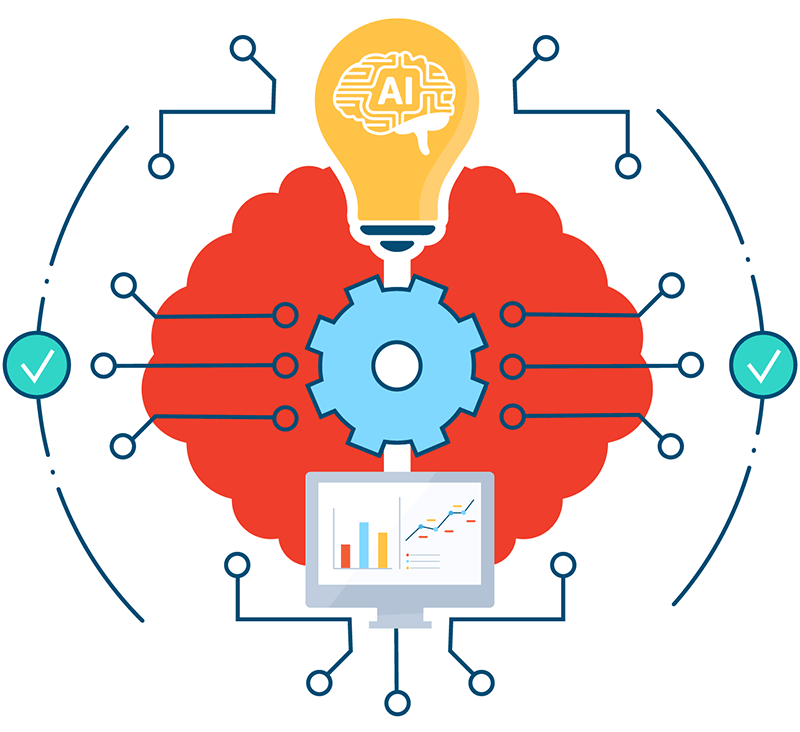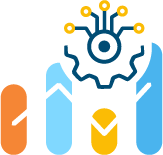
O que constitui uma plataforma MLOps?
Uma plataforma MLOps (Machine Learning Operations) compreende uma coleção de ferramentas, frameworks e metodologias projetadas para simplificar a implantação, o monitoramento e a manutenção de modelos de aprendizado de máquina em ambientes operacionais. Esta plataforma é um elo entre a ciência de dados e as operações de TI, automatizando diversas tarefas associadas a todo o ciclo de vida do aprendizado de máquina.
As plataformas MLOps garantem a incorporação suave e eficiente de modelos de aprendizado de máquina na infraestrutura de uma organização.
- Administração simplificada: O objetivo principal do MLOps plataformas é melhorar os processos de gestão associados aos modelos de aprendizado de máquina, otimizando assim a eficiência administrativa geral.
- Soluções escaláveis: As plataformas MLOps priorizam o desenvolvimento de modelos de aprendizado de máquina que podem ser rapidamente dimensionados para atender às crescentes necessidades organizacionais, garantindo adaptabilidade e flexibilidade.
- Padrões de qualidade e desempenho: As plataformas MLOps são dedicadas a manter altos padrões de qualidade e desempenho na implantação e execução de modelos de aprendizado de máquina, garantindo resultados confiáveis e eficazes.

Otimização gratuita de custos de nuvem e gerenciamento aprimorado de recursos de ML/IA para toda a vida
Características notáveis das plataformas MLOps
Motor de colaboração ágil
As plataformas MLOps impulsionam a comunicação e a colaboração eficazes entre cientistas de dados, engenheiros de ML e equipes de operações, promovendo inovação rápida e tomada de decisões decisivas, aproveitando um mecanismo de colaboração elegante.
Evolução do modelo dinâmico
As plataformas MLOps capacitam a evolução dinâmica do modelo ao facilitar o armazenamento e o gerenciamento de múltiplas iterações de modelos ML. Esse controle abrangente de versão do modelo abrange código, configurações e dependências, garantindo adaptabilidade no cenário em constante evolução.
Governança do modelo Sentinel
No comando da governança de modelos, as plataformas MLOps atuam como sentinelas, aplicando medidas robustas de controle de acesso, conformidade e segurança dentro dos fluxos de trabalho de ML. Essa supervisão vigilante garante transparência e adesão às políticas organizacionais e aos padrões regulatórios.
Domínio da crônica de dados
Mestres em crônicas de dados, as plataformas MLOps demonstram capacidades robustas em rastrear e gerenciar diversos conjuntos de dados. Esse domínio garante reprodutibilidade e rastreabilidade no reino dinâmico de projetos de machine learning.
Integração contínua automatizada (CI/CD)
As plataformas MLOps orquestram a construção, o teste e a implantação contínuos de modelos de ML de forma automatizada. Esse desempenho em estágios garante que as atualizações ocorram perfeitamente, reduzindo erros e aprimorando a eficiência geral dos fluxos de trabalho.
Rastreamento de experimentos
As plataformas MLOps facilitam o registro sistemático, a comparação e a visualização de experimentos, hiperparâmetros e resultados, embarcando em um rastreamento perspicaz de experimentos. Esse rastreamento simplifica o processo de seleção de modelos, fornecendo insights inestimáveis para decisões informadas.
Escalabilidade
Como inovadores de artesanato em escala, as plataformas MLOps oferecem suporte ao desenvolvimento e gerenciamento de modelos de ML em escala. Essas plataformas garantem adaptabilidade e crescimento sustentado ao capacitar as organizações a navegar pelos desafios impostos pelo aumento dos volumes e da complexidade dos dados.
Monitoramento de modelo
Plataformas MLOps rastreiam o desempenho de modelos implantados, detectando desvios de dados e degradação de modelos. Sistemas de alerta ficam de guarda, mantendo a precisão e a confiabilidade do modelo ao longo do tempo.
Implantação do modelo
As plataformas MLOps simplificam a implantação de modelos de ML em diversos ambientes, seja na nuvem, no local ou em dispositivos de ponta, dominando a arte da implantação. Esse domínio da implantação simplifica o processo geral de implantação.
Validação do modelo
As plataformas MLOps realizam testes e validações rigorosos em garantia de qualidade, garantindo que os modelos de ML atendam aos padrões predefinidos de desempenho e qualidade antes da implantação.
Integração de ecossistemas
As plataformas MLOps são projetadas como compositoras e visam a harmonia do ecossistema, integrando-se perfeitamente com ferramentas, bibliotecas e frameworks populares de ciência de dados. Essa integração harmoniosa promove compatibilidade com fluxos de trabalho e ecossistemas existentes, garantindo um processo de machine learning coeso e simplificado.
Benefícios revelados pelas plataformas MLOps
Reprodutibilidade e rastreabilidade
As plataformas MLOps capacitam as organizações a manter o controle de versão para dados, códigos, modelos e experimentos. Essa capacidade crucial garante que os cientistas de dados possam reproduzir resultados sem esforço, rastrear a linhagem do modelo e comparar diferentes versões do modelo, contribuindo para a qualidade sustentada do modelo ao mesmo tempo em que aderem às regulamentações do setor.
Garantia de governança e conformidade
As plataformas MLOps oferecem ferramentas e processos robustos para governança de modelos, controle de acesso e auditoria. Esse recurso garante que as organizações possam manter a conformidade com as regulamentações do setor e manter o uso ético e responsável de modelos de aprendizado de máquina, estabelecendo uma base para governança e conformidade dentro do ecossistema de ML.
Colaboração facilitada
As plataformas MLOps servem como um hub centralizado para gerenciamento de projetos de ML, promovendo a colaboração entre cientistas de dados, engenheiros de ML e stakeholders. Equipadas com ferramentas de comunicação, gerenciamento de projetos e compartilhamento de conhecimento, essas plataformas quebram silos entre equipes, facilitando transições suaves entre diferentes estágios do ciclo de vida de ML, levando, em última análise, a modelos mais precisos e tempo de lançamento no mercado mais rápido.
Qualidade e desempenho elevados do modelo
As plataformas MLOps vêm com ferramentas que avaliam automaticamente o desempenho dos modelos de machine learning. Isso garante uma avaliação completa e imparcial, orientando melhorias na eficácia do modelo.
- Ajuste de hiperparâmetros: Essas plataformas simplificam a otimização dos hiperparâmetros do modelo e configurações de ajuste fino para melhorar a precisão e eficiência dos modelos de aprendizagem de máquina.
- Monitoramento de desempenho: As plataformas MLOps incluem recursos para monitorar continuamente modelos implantados, oferecendo insights em tempo real sobre seu desempenho e confiabilidade. Essa avaliação contínua é crucial para manter a eficácia do modelo.
- Padrões de desempenho consistentes: As ferramentas que as plataformas MLOps fornecem garantem que os modelos implantados atendam consistentemente aos padrões de desempenho estabelecidos. Essa consistência é vital para construir confiança na confiabilidade e precisão das previsões do modelo.
- Alertas para desvio de dados e degradação do modelo: As plataformas MLOps visam detectar e alertar equipes sobre desvios de dados ou instâncias de degradação de modelos. Esses alertas permitem medidas proativas, garantindo intervenções oportunas para manter a precisão dos modelos implantados.
- Manutenção proativa e reciclagem: Armadas com alertas e insights antecipados, as plataformas MLOps capacitam as equipes a tomar medidas de manutenção proativas e iniciar processos de retreinamento conforme necessário. Essa abordagem proativa garante que os modelos permaneçam robustos e eficazes ao longo do tempo.
Custo-eficiência
As plataformas MLOps automatizam vários aspectos do ciclo de vida do ML e facilitam a colaboração eficiente da equipe, contribuindo para economias de custos significativas. Estas economias estendem-se aos recursos humanos e à infra-estrutura informática, otimizando a alocação de recursos em projetos de aprendizado de máquina.
Tempo de colocação no mercado acelerado
As plataformas MLOps aceleram a implantação do modelo de aprendizado de máquina por automatizando os principais processos do ciclo de vida do ML, como pré-processamento de dados, treinamento de modelo e implantação. Essa capacidade de implantação rápida permite que as organizações respondam rapidamente às condições dinâmicas do mercado e às mudanças nas necessidades dos clientes.
Soluções de escalabilidade
As plataformas MLOps suportam simultaneamente a implantação e o gerenciamento de vários modelos personalizados para projetos de machine learning em larga escala. Essas plataformas integram-se perfeitamente à infraestrutura de nuvem e aproveitam recursos de computação distribuída, dimensionando o treinamento e a implantação do modelo de acordo com as necessidades em evolução da organização.
Encontro em página GitHub OptScale – plataforma de código aberto MLOps e FinOps para executar ML/IA e cargas de trabalho regulares na nuvem com desempenho e custo ideais
O OptScale oferece aos engenheiros de ML/IA:
- Rastreamento de experimentos
- Controle de versão do modelo
- Placares de ML
- Hiperafinação
- Instrumentação de treinamento de modelo
- Recomendações de otimização de custos de nuvem, incluindo utilização ideal de RI/SI e SP, otimização de armazenamento de objetos, dimensionamento correto de VM, etc.
- Gerenciamento de custos do Databricks
- Localizador de objetos duplicados S3